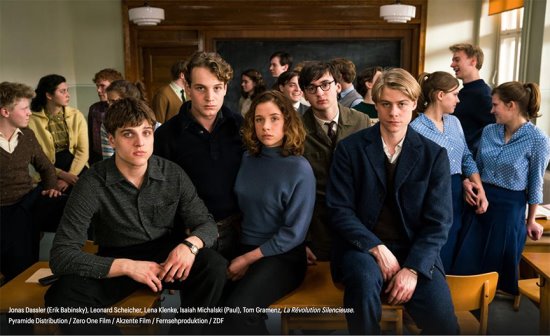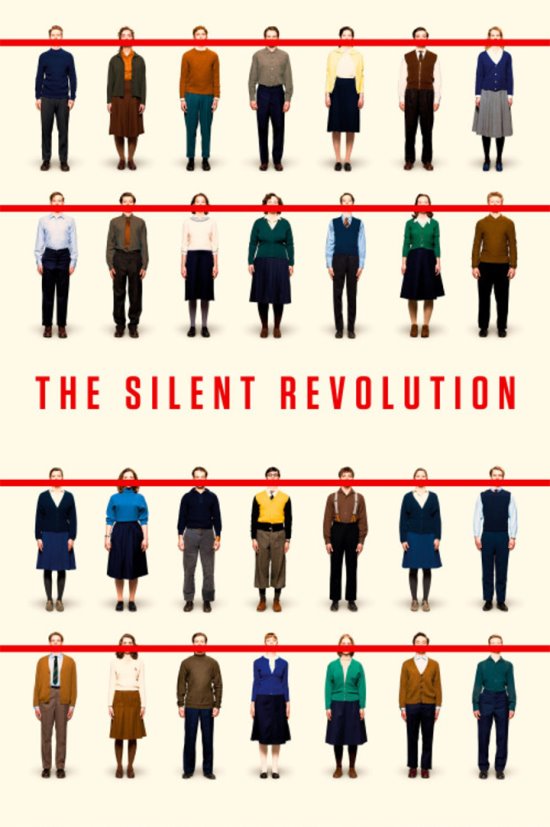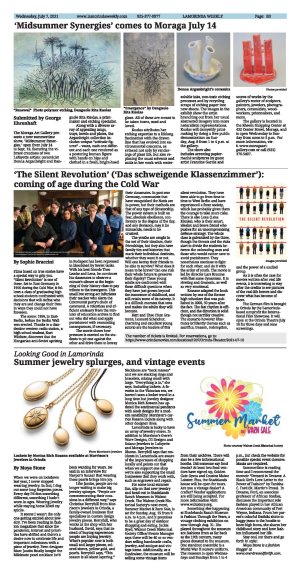| | Published July 7th, 2021
| 'The Silent Revolution' ('Das schweigende Klassenzimmer'): coming of age during the Cold War
| | | By Sophie Braccini |  | | Images provided |
Films based on true stories have a special way to grip you. "Silent Revolution" is one of these. Set in East Germany in 1956 during the Cold War, it follows a class of graduating high school students confronted with decisions that will define who they are and change their lives in ways they could not have foreseen.
 The scene: 1956, in East-Berlin, before the Berlin Wall was erected. Thanks to a clandestine western radio station, a high school student, Kurt Waechter, discovers that the Hungarian anti-Soviet uprising in Budapest has been repressed in bloodshed by Soviet tanks. With his best friends Theo Lemke and Lena, he convinces his classmates to observe a minute's silence at the beginning of their history class to pay tribute to the insurgents. This small but strong act infuriates their teacher who alerts the Communist party's chain of command. A relentless and efficient emissary from the minister of education arrives to find out who did what and apply punishment with resounding consequences, if necessary.
The scene: 1956, in East-Berlin, before the Berlin Wall was erected. Thanks to a clandestine western radio station, a high school student, Kurt Waechter, discovers that the Hungarian anti-Soviet uprising in Budapest has been repressed in bloodshed by Soviet tanks. With his best friends Theo Lemke and Lena, he convinces his classmates to observe a minute's silence at the beginning of their history class to pay tribute to the insurgents. This small but strong act infuriates their teacher who alerts the Communist party's chain of command. A relentless and efficient emissary from the minister of education arrives to find out who did what and apply punishment with resounding consequences, if necessary.
 The movie shows how pressure is exerted on the students to pit one against the other and drive them to betray their classmates. In post-war Germany, communists that have vanquished the Nazis are in power, but their methods are that of any type of dictatorship. The power system is built on fear, absolute obedience, conformity to the dogma of the day, and any deviancy, may it be minuscule, needs to be crushed.
The movie shows how pressure is exerted on the students to pit one against the other and drive them to betray their classmates. In post-war Germany, communists that have vanquished the Nazis are in power, but their methods are that of any type of dictatorship. The power system is built on fear, absolute obedience, conformity to the dogma of the day, and any deviancy, may it be minuscule, needs to be crushed.
 The youths are caught in the net of their idealism, their friendships, but they also have family ties and histories that mark their individual destinies, whether they want it or not. Will one betray their friends to be able to survive? What does it mean to be brave? Can one risk their whole future to preserve their dignity? These young adults are confronted with these difficult questions when they have just grown beyond the innocence of childhood, and still retain some of its naivety. It is a difficult moment that tests and makes the adults they will become.
The youths are caught in the net of their idealism, their friendships, but they also have family ties and histories that mark their individual destinies, whether they want it or not. Will one betray their friends to be able to survive? What does it mean to be brave? Can one risk their whole future to preserve their dignity? These young adults are confronted with these difficult questions when they have just grown beyond the innocence of childhood, and still retain some of its naivety. It is a difficult moment that tests and makes the adults they will become.
 Kurt and Theo (Tom Gramenz, Leonard Scheicher, charming and excellent young actors) are the leaders of this silent revolution. They have been able to go from time to time to West Berlin and have experienced a freer society, which has probably given them the courage to take more risks. There is also Lena (Lena Klenke), who is their smart, idealist and brave friend who pushes for an uncompromising defense strategy. The whole class is galvanized by the three, though the threats and the risks start to divide the students between the unbending ones and those who would rather cave to avoid punishment. They nonetheless continue to fight for each other, and do it with the ardor of youth. The movie is led by director Lars Kraume with that same dynamism. It is riveting and dramatic, as well as very emotional.
Kurt and Theo (Tom Gramenz, Leonard Scheicher, charming and excellent young actors) are the leaders of this silent revolution. They have been able to go from time to time to West Berlin and have experienced a freer society, which has probably given them the courage to take more risks. There is also Lena (Lena Klenke), who is their smart, idealist and brave friend who pushes for an uncompromising defense strategy. The whole class is galvanized by the three, though the threats and the risks start to divide the students between the unbending ones and those who would rather cave to avoid punishment. They nonetheless continue to fight for each other, and do it with the ardor of youth. The movie is led by director Lars Kraume with that same dynamism. It is riveting and dramatic, as well as very emotional.
 Kraume adapted the book written by one of the former high schoolers that was published in 2006, 50 years after the fact. The fast rhythm is efficient, and the direction is solid though not terribly creative. The scenario however illustrates brilliantly themes such as sacrifice, treason, redemption, and the power of a unified group.
Kraume adapted the book written by one of the former high schoolers that was published in 2006, 50 years after the fact. The fast rhythm is efficient, and the direction is solid though not terribly creative. The scenario however illustrates brilliantly themes such as sacrifice, treason, redemption, and the power of a unified group.
 As it is often the case for movies written after real life events, it is interesting to stay after the credits to see pictures of the real-life heroes and discover what has become of them.
As it is often the case for movies written after real life events, it is interesting to stay after the credits to see pictures of the real-life heroes and discover what has become of them.
 The German film is brought to Orinda by the Lamorinda-based nonprofit the International Film Showcase. It will open at the Orinda Theatre July 16 for three days and nine screenings.
The German film is brought to Orinda by the Lamorinda-based nonprofit the International Film Showcase. It will open at the Orinda Theatre July 16 for three days and nine screenings. |
 | | Images provided | | | | | | | | | | | |




